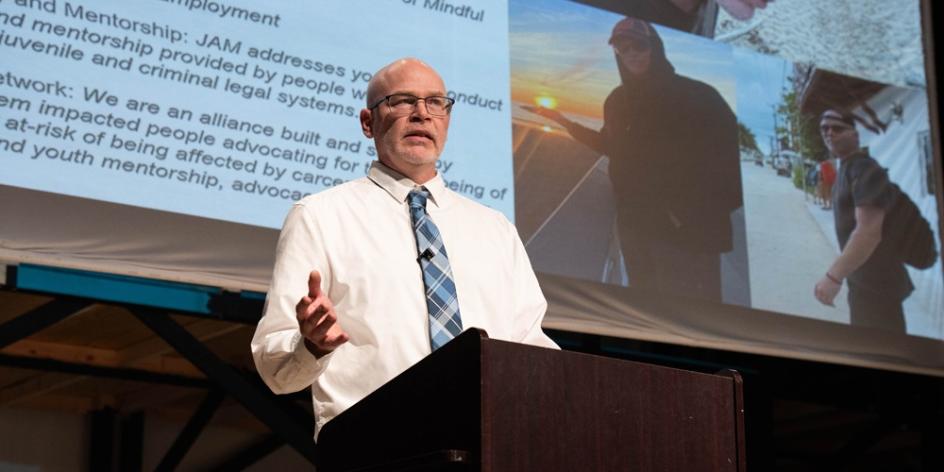
There are a variety of ways to conduct research. Heidelberg students heard a unique perspective from writer, qualitative researcher and youth mentor Shawn McWeeney on Thursday. He traveled from Oregon to share his journey to raise awareness around the criminal legal system and incarceration as the keynote speaker for the Minds@Work Research Conference.
Shawn’s journey has been a progression of moments that kick-started self-growth. But it wasn’t easy. Although he served a 25-year prison sentence starting at 18 for his involvement in a robbery, he found his way to effectively empowering youth and helping them find resilience and pathways to success.
He transformed his life while in prison, first by developing an appreciation for reading and then by learning yoga. Ultimately, he earned a master’s degree and now focuses on studying and sharing insights into trauma, delinquency, the criminal legal system, the incarceration experience and re-entry into society.
Shawn’s research has been a two-stage discovery process: external and personal. Externally, he has learned to positively advocate for change, challenge the system and contribute to his community, he explained. His personal focus has been on developing critical thinking skills, expanding his perspective and discovering new possibilities for growth and development.
He was vulnerably honest about his early life and life and while incarcerated. A challenging childhood where Shawn was “irregulated” led first to delinquent behavior which progressed to drug use and eventually a serious felony. “Things went from bad to worse,” he said.
In prison, he found himself “reduced to my action.”
“I was a kid just trying to figure out my way without a lot of support.”
Incarcerated at 18, he didn’t have much of a sense of self. But learning new perspectives changed him.
“It started with reading,” Shawn said. “That was the thing to do for me. It gave me perspective outside of myself and allowed me to reflect on the world.”
Five years into his sentence, he started meditating, discovering that also helped with perspective and learning to be calm. Twelve years in, he did some informal research and found there were a significant number of inmates interested in going to college. Thus began Shawn’s journey successful re-entry.
He became involved in a Restorative Justice Victim Impact Group, which is where he met his friend and current ’Berg criminology professor Dr. Sarah Lazzari, who was volunteering with the program.
“I started to see myself outside of crime and I was able to grow from that,” he said.
He took 22 classes through the prison’s Inside-Out Program, which incorporated college students as volunteers. Those experiences proved to be not only impactful but humanizing and normalizing. “They gave me a lot of confidence and helped me create my own agency.”
“I went in (to prison) before the internet, so there was a lot to learn – still is,” Shawn said. “I had to learn how to adult, so in that way, re-entry was definitely challenging.” But he’s made the best of the opportunity.
Upon his release in 2020, Shawn entered a graduate program at the University of Oregon, eventually earning his Master of Education degree. He worked on a substance abuse study and even published a paper, with Sarah as a co-author, on the Experience of Loneliness: COVID vs. Incarceration. He founded Juvenile Advocacy and Mentorship (JAM), the founding program of the Oregon Justice Network. JAM has become a successful non-profit that continues to uplift youth who need that extra level of support.
Shawn brings his own life experience to research, which comes with an extra burden: vulnerability. Through his eyes, research “means self-development and program development.” Part of the process has been mastering the skill of mental exercises of setting the mind and nervous system.
“Life is a mosaic and we are a compilation of our experiences,” said Shawn, who has turned his around to benefit others.